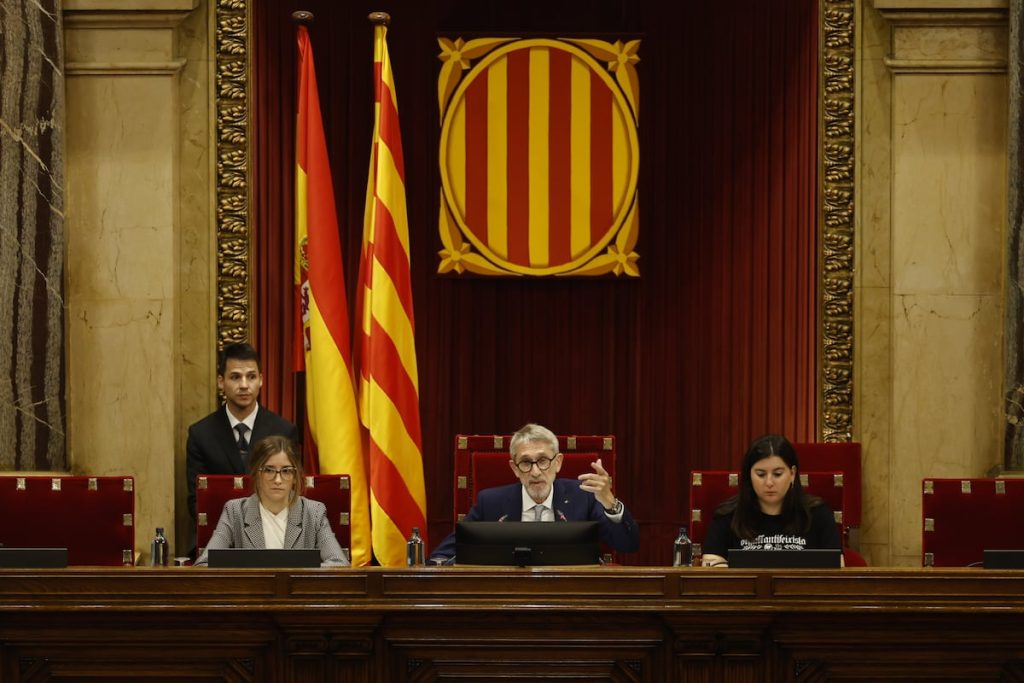The Constitutional Court has admitted for processing on Tuesday, by nine votes to two, the appeal for protection of the Popular Party (PP) against the decision of the Age Bureau of the Catalan Parliament, which on June 10 allowed the absent deputies Carles Puigdemont and Lluís Puig to vote electronically from outside the Chamber, as they are fugitives from justice. The Court has rejected, however, the extremely urgent precautionary measure also requested by the Popular Party: the suspension of the effects of said vote. The PP argued that the participation of Puigdemont and Puig tainted the election process for the members of the Chamber, including its president, and fraudulently initiated the legislature. The Age Bureau of the Parliament allowed Puigdemont and Puig to vote electronically despite the Constitutional Court’s doctrine prohibiting fugitive deputies from using that formula, reserved for absent deputies due to illness, pregnancy, or supervening circumstances. With its decision to now admit the appeal for processing but not the extremely urgent precautionary measure, the court chooses to consider the constitutional relevance of the conflict but without preventing the start of the Catalan legislature.
The majority of the court has also rejected the idea of sending a personal request to President Josep Rull and the rest of the members of the Bureau urging them not to authorize the votes of Puigdemont and Puig again. Such a request would have made it possible for them to be charged with a crime of disobedience if they were to accept the votes of the fugitive deputies again in the future. The Constitutional Court has a well-established doctrine that only allows for specific cases of electronic or delegate voting, and it excludes the consideration of “constitutionally valid circumstances (…) in which someone voluntarily decides to evade the action of the Spanish criminal jurisdiction and is subject to a search and arrest warrant,” as is the case with the two deputies mentioned. This was stated by the court in a recent ruling at its last plenary session, two weeks ago.
By not accompanying the admission for processing with a request to the Bureau, the Constitutional Court gives room for the Chamber’s governing body to avoid a criminal charge for disobedience. The court believes it should do so because the decision to ignore the criteria set by its own doctrine was made by the previous Age Bureau, not by the one elected afterwards. Therefore, the breach recorded would not be attributable to the resulting Bureau of the irregular vote, but to the one that allowed the procedure, which no longer exists, which is why the request was rejected. The court understands that the current Bureau is well aware of its doctrine and is aware that it should not allow the electronic or delegated votes of Puigdemont and Puig to be taken into account in future votes while their current legal situation persists.
The Constitutional Court’s decision has a direct impact on the functioning of the Catalan Parliament and the legitimacy of its proceedings, especially in regard to the election of members of the Bureau and the validation of votes from fugitive deputies. The court’s ruling highlights the importance of upholding constitutional principles regarding the participation of deputies in parliamentary activities and the consequences of allowing fugitive deputies to vote electronically or by delegation. It also emphasizes the need for compliance with the court’s established doctrine in order to prevent further constitutional breaches in the future.
The admission of the PP’s appeal for protection against the decision of the Age Bureau of the Catalan Parliament sets a precedent for future cases involving fugitive deputies and their participation in parliamentary activities. The rejection of the extremely urgent precautionary measure requested by the PP indicates the court’s cautious approach to intervening in the legislative process and the functioning of the Chamber. The court’s decision to allow the start of the legislative session in Catalonia while considering the constitutional implications of the conflict demonstrates a balance between the right to challenge irregularities and the need to prevent disruptions to the normal functioning of the Parliament.
Overall, the decision by the Constitutional Court to admit the appeal for processing but not to issue an immediate precautionary measure sends a message to the governing body of the Catalan Parliament to act in accordance with constitutional principles and the court’s established doctrine. This decision emphasizes the importance of upholding the rule of law and respecting the legal procedures and guidelines set forth by the Constitutional Court in order to maintain the legitimacy of parliamentary activities and ensure the proper functioning of the legislative process. The court’s ruling sets a precedent for future cases involving similar issues and serves as a reminder of the constitutional principles that govern the relationship between elected officials, the judiciary, and the rule of law in a democratic society.














